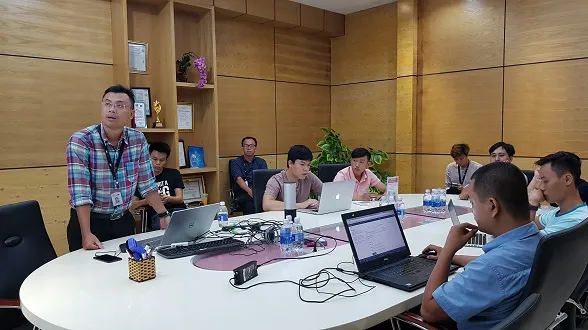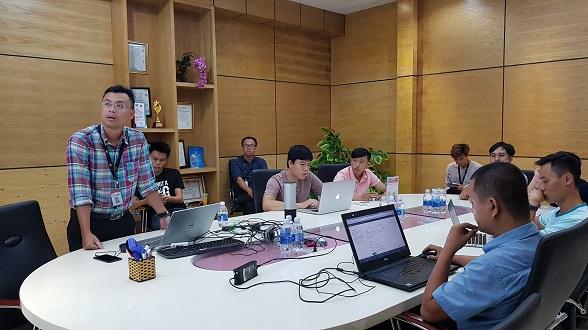React Native Training Course

News
React Native Training Course On May
On May 21, 2018, S3Corp. continued its commitment to internal knowledge sharing through a technical training session focused on React Native. This session was part of an ongoing effort to equip developers with current skills in mobile app development using modern frameworks. The training was conducted by Mr. Quang Nguyen. His presentation focused on the practical application of React Native in building native mobile applications using JavaScript and React. The goal of the session was to explore the core functionalities of the framework and understand how it helps speed up development without sacrificing performance or user experience.
05 Jun 2018
React Native Technical Sharing
On May 21, 2018, S3Corp. continued its commitment to internal knowledge sharing through a technical training session focused on React Native. This session was part of an ongoing effort to equip developers with current skills in mobile app development using modern frameworks.
The training was conducted by Mr. Quang Nguyen. His presentation focused on the practical application of React Native in building native mobile applications using JavaScript and React. The goal of the session was to explore the core functionalities of the framework and understand how it helps speed up development without sacrificing performance or user experience.
React Native Introduction During the Session
The training introduced React Native as a JavaScript framework developed by Facebook. It enables developers to create native mobile apps for iOS and Android using React. Unlike hybrid solutions that rely on WebView, React Native renders real native components, making the resulting app function like one built with native tools.
React Native allows developers to write mobile applications using JavaScript and React components. The framework bridges the gap between web development and mobile development by enabling the reuse of code across platforms. Developers trained in React can transition into mobile development with reduced learning curves, using familiar syntax and principles.
Mr. Quang Nguyen highlighted that a React Native app is not a web app running inside a wrapper. It uses the same native platform APIs as apps developed in Swift, Java, or Objective-C. This characteristic ensures consistent user interface behavior and performance across devices.
Efficiency in Mobile Development Using React Native
One of the key features discussed during the training was the ability to speed up the development process using React Native. Developers can see changes instantly through the hot-reloading feature, which allows code edits to be reflected without recompiling the entire application. This approach saves time and makes debugging and iterative development much more efficient.
Traditional native development requires time-consuming builds and redeployments. React Native simplifies this process by enabling developers to reload parts of the app during development without affecting the current app state. This advantage significantly shortens development cycles, especially during the prototyping and testing phases.
Integration with Native Code
The session also covered how React Native allows for integration with existing native code. If certain functions require high performance or access to platform-specific APIs, developers can write modules in Objective-C, Java, or Swift and integrate them into the React Native application.
This flexibility was emphasized as one of the core strengths of the framework. Instead of being restricted to JavaScript, developers can extend React Native by using platform-specific modules whenever necessary. The seamless transition between React Native and native modules allows teams to optimize specific features without rewriting the entire app in native languages.
Real-World Benefits of Adopting React Native
The training highlighted that React Native supports faster app development. Teams can use a single codebase for both Android and iOS platforms. This capability reduces development and maintenance costs, especially for projects that require deployment across multiple platforms.
In terms of performance, React Native apps can perform on par with native apps when properly optimized. Since the framework uses native components, it ensures a smooth user interface, native navigation, and proper access to platform APIs.
Furthermore, development teams already experienced in JavaScript can quickly adapt to React Native. There is no need to learn separate languages or environments for each platform. This makes onboarding easier and accelerates project ramp-up times.
Conclusion of the Session
The session provided participants with a clear understanding of how React Native works, how it differs from hybrid frameworks, and what practical advantages it brings to mobile app development. Developers learned that React Native is not a compromise between performance and speed. It offers a balanced approach to building efficient and responsive applications using one codebase while retaining the ability to scale and optimize using native code when required.
The event ended with thanks to Mr. Quang Nguyen for his engaging and informative presentation. His session clarified the essential aspects of using React Native in real-world projects and motivated many attendees to explore the framework further in their development work.
S3Corp. continues to invest in technical knowledge sharing sessions like this to ensure teams stay current with relevant technologies and can deliver better results across projects.



_1746790910898.webp&w=384&q=75)
_1746790956049.webp&w=384&q=75)
_1746790970871.webp&w=384&q=75)
